

Climate Change Is Ushering in a New Pandemic Era. 7 Ways You Could Catch COVID Now, Says Doctor Birx. With coronavirus cases breaking records daily, our hospitals are at a "breaking point" says Deborah Birx, the Coronavirus Response Coordinator for the White House Coronavirus Task Force.

She would know—in the role, she travels America, "from the Billings Clinic in Montana to across this great country"—to see first hand the damaging effects of the virus, promoting ways to stop it. Yesterday she spoke with Chuck Todd on Meet the Press about what you can and cannot do during this unprecedented surge. "This is not just the worst public health event," she warned. "This is the worst event that this country will face"—period. Read on to hear her warning, and to ensure your health and the health of others, don't miss these Sure Signs You've Already Had Coronavirus. Dr. Covid-19 “long haulers” are organizing online to study themselves. That Slack group has ballooned to more than 7,000 active members.

“There was a huge group of patients who felt alone,” Lowenstein says. “They had no idea that they were not alone.” There are subgroups based on geography (“The UK group is very active,” Lowenstein says) and symptoms (neurological symptoms are a popular topic). Members are from all over the world, though Lowenstein suspects the fact that it’s on Slack might bias its participation toward those who know how to use the software. For Long-Haulers, Covid-19 Takes a Toll on Mind as Well as Body. Although social media groups provide validation, there is also some risk.
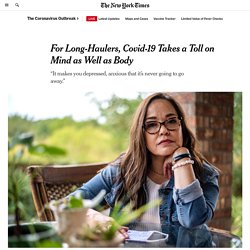
Groups that do not moderate their content can contribute to the spread of misinformation when users share unverified medical advice. (Survivor Corps requires people to link to trustworthy sources, and Body Politic deploys volunteers to moderate posts.) Support group members also sometimes inadvertently reinforce one another’s fears through detailed discussion of their own medical experiences, according to Jo Daniels, a psychologist at the University of Bath and an author of a recent study in the journal American Psychologist on Covid-19 and mental health.
Some long-haulers said that their doctors recommended limiting the time they spent on these groups daily so they could take in information without becoming overwhelmed. A dilemma for 'long-haulers': Many can't prove they had Covid-19. As the coronavirus pandemic rolls on, an unknown number of seemingly recovered patients are experiencing what is being called post-Covid syndrome — weeks or months of profound fatigue, fevers, problems with concentration and memory, dizzy spells, hair loss, and many other troubling symptoms.
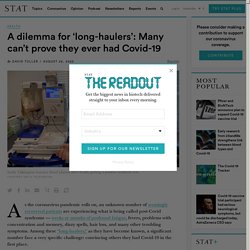
Among these “long-haulers,” as they have become known, a significant number face a very specific challenge: convincing others they had Covid-19 in the first place. Because of widespread supply shortages and overwhelmed medical providers, many who sought viral testing in the first months of the pandemic were refused for not meeting strict criteria.
Covid-19's 'serious, long-term impact' can improve with time, early evidence suggests. Two early research reports to be presented Monday at the European Respiratory Society International Congress describe how severe infection with the coronavirus that causes Covid-19 can leave lasting lung damage and, in some cases, even psychological wounds.
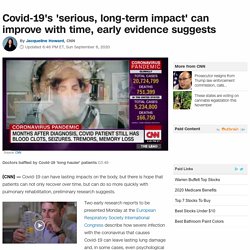
"The bad news is that people show lung impairment from COVID-19 weeks after discharge; the good news is that the impairment tends to ameliorate over time, which suggests the lungs have a mechanism for repairing themselves," Dr. Sabina Sahanic, a clinical PhD student at the University Clinic in Innsbruck, Austria, who was involved in one of the reports, said in a news release. So far, only study abstracts of the new research have been released and the findings are preliminary, but they shed new light on the long-term impacts of Covid-19.
Long-Hauler COVID Patients Just Met With The WHO. Courtesy Fiona Lowenstein Screenshot of a Zoom meeting with 60 long-haulers and top officials at the WHO on Friday.
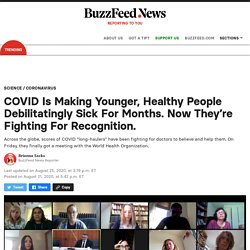
There were weeks when Hannah Davis couldn’t remember how to send a text message. On top of the extreme fatigue, racing heart rate, and difficulty breathing she experienced daily, the most terrifying part of being sick with COVID-19 for the last 21 weeks, Davis said, has also been one of the hardest to explain: losing her mind. “I feel like I have a brain injury. From ‘brain fog’ to heart damage, COVID-19’s lingering problems alarm scientists. Science’s COVID-19 reporting is supported by the Pulitzer Center and the Heising-Simons Foundation.

Athena Akrami’s neuroscience lab reopened last month without her. Life for the 38-year-old is a pale shadow of what it was before 17 March, the day she first experienced symptoms of the novel coronavirus. At University College London (UCL), Akrami’s students probe how the brain organizes memories to support learning, but at home, she struggles to think clearly and battles joint and muscle pain. Long-Haulers Are Redefining COVID-19.
Editor’s Note:The Atlantic is making vital coverage of the coronavirus available to all readers.
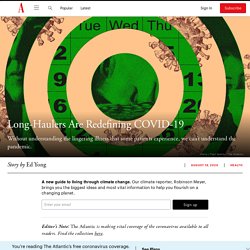
Find the collection here. The Most Common Covid-19 'Long-Haul' Effects. Seeking causes of post-Covid symptoms in study of college kids. From 2014 to 2018, DePaul University psychologist Leonard Jason and colleagues collected personal information and blood samples from more than 4,500 healthy college students.
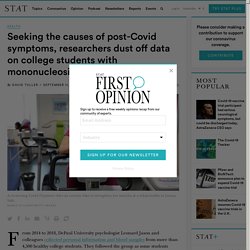
They followed the group as some students contracted mononucleosis and a small proportion of those subsequently developed chronic fatigue syndrome — the debilitating disease also called myalgic encephalomyelitis, or ME/CFS, that is frequently triggered by an acute viral illness. Life will never be the same for people over 60 — even with a COVID-19 vaccine. 30 Singular Films to Watch in Quarantine. How to watch: Rent from various outlets Rat Film (2016, directed by Theo Anthony) Theo Anthony’s Rat Film is a journalistic work that doubles as a dreamy collage, a story of a city that incorporates tragedy, comedy, and grim legacy.

After a late-night encounter with a rodent stuck in his trash can, Anthony finds himself exploring Baltimore’s history of rat infestations, which ties into housing segregation, redlining, urban neglect, and the city’s long-lasting problems with systemic racism. Incorporating the perspectives of city officials, community activists, and neighbors, Anthony turns a nonfiction project into a portrait of the home he loves, full of praise and regret. Should you fly yet? An epidemiologist and an exposure scientist walk you through the decision process. We don’t know about you, but we’re ready to travel. And that typically means flying.
We have been thinking through this issue as moms and as an exposure scientist and infectious disease epidemiologist. While we’ve decided personally that we’re not going to fly right now, we will walk you through our thought process on what to consider and how to minimize your risks. Why the fear of flying? The primary concern with flying – or traveling by bus or train – is sitting within six feet of an infected person. A secondary concern is contact with contaminated surfaces. Before you book, think. How 'rewirements' can help train your brain to be happy. Anyone else feeling a bit like Eeyore these days, with a personal rain cloud hovering above you? When so much is uncertain, being able to look on the bright side and find joy feels like a nice thought, but a hard ask. Maybe, then, it’s high time we teach ourselves to be positive, rather than waiting for those sunny feelings to materialize. On a recent episode of the podcast Kind World, Yale happiness expert and professor of psychology Laurie Santos, PhD, shares how little exercises, which she calls “rewirements,” can train your brain to be happy.
5 exercises to offset too much sitting. Prolonged sitting is an unavoidable reality for many. And with lots of us spending more time inside, as the pandemic continues, it's inevitable that we're spending even more time being sedentary. The irony is that we're staying home to protect our health, but all that added sitting is putting our health at risk in other ways. Poor posture is the most recognized, tangible problem associated with too much sitting.
Many of us know, all too well, how our sitting posture contributes to neck and back pain while limiting our ability to move our shoulders and spine. Simple, passive stretches, like standing and raising your arms overhead, can provide immediate relief of tension and help break up long bouts of sitting, but they don't create long-term posture changes. How to safely order food delivery, takeout and groceries during coronavirus quarantine. For the most up-to-date news and information about the coronavirus pandemic, visit the WHO website. If you're staying home more often as a result of the coronavirus pandemic, you might be wondering: Can I still order food or grocery delivery? And is it safe? The answer, for now, is yes: Food and grocery delivery services such as DoorDash, Postmates, Grubhub, Uber Eats and Instacart are still up and running. Mental Health Awareness: How to Improve Your Mental Health on a Daily Basis. May is Mental Health Awareness Month, and there’s no question that the COVID-19 pandemic is accelerating the mental health crisis that already existed before.
Thrive Global surveyed over 8,000 Americans over the past month on the impacts of the COVID-19 pandemic, and 82% of individuals feel that the pandemic has had a bigger negative impact on their stress than any other event in history. The problem is big, but the solutions start small. We asked our Thrive community to share the little changes they’re implementing in their lives that are improving their mental health during this time.
Which of these will you try? Lens Rentals. The reason Zoom calls drain your energy - BBC Worklife. Big group calls can feel particularly performative, Petriglieri warns. Why are some people with Covid-19 asymptomatic? Evidence points to 2 factors. Covid-19 immunity and testing, explained. The Covid-19 coronavirus meets its most formidable foe the moment it enters the human body. The immune system is waiting, ready for action, and it determines who dies and who survives. It is why the vast majority of the infected have recovered from the disease. Yet one of the most important unknowns is why some people’s immune systems are up to the task of clearing out the virus while others are sluggish or overreact, leading to death.
There's one overlooked factor to consider in fighting Covid-19. Horrifying video shows how coronavirus spreads at the grocery store. Researchers in Finland created a high-tech simulation showing how tiny particles can spread in a confined space like a grocery store after a cough or sneeze.The findings show exactly how a person infected with the novel coronavirus would spread it, and why strict hygiene and social distancing measures are mandatory.Tiny aerosol particles that can carry the virus can linger in the air for several minutes or even longer in a closed space, posing a risk to anyone walking through the invisible particle cloud.Visit BGR’s homepage for more stories. Is it safe to shop for food during the coronavirus pandemic? Shopping for food and even ordering online can be stressful at this time, as the novel coronavirus outbreak is out of control in many countries around the world.Experts from the CDC and FDA have made it clear that food, even if contaminated with the novel coronavirus, isn’t harmful and won’t lead to an infection as long as other protection measures are in place.The grocery shopping experience needs careful planning as well as increased hygiene.
Is it safe to shop for food during the coronavirus pandemic? J.K. Rowling Says This Breathing Technique Got Rid of Her COVID-19 Symptoms—but Not All Experts Think It Works. The best virtual backgrounds to use on Zoom for your next business meeting. Don't settle for a boring scene of your home office during an online Zoom meeting. Opt for a virtual background instead. These days it seems that nearly everyone is working remotely, and the cool new telecommuting office trend is to have a virtual background for your Zoom meetings. The 3 triggers that turn coronavirus from a mild illness to a lethal one. Why it's not OK to take small social risks during the COVID-19 pandemic. We’ve all heard the advice from public health officials: stay at home, wash your hands and don’t touch your face! 9 Yoga For Beginners YouTube Tutorials To Ease Your Way Into Namaste. Use These Materials To Make A Face Mask.
Use These Materials To Make A Face Mask. What to Stream: Forty of the Best Movies on Netflix Right Now. 11 best ways to entertain yourself when you're in quarantine. Delivereat - a directory of independent □ businesses delivering during lockdown. ‘We can’t go back to normal’: how will coronavirus change the world? Free entertainment to help you survive coronavirus social distancing.
It's Time to Face Facts, America: Masks Work. Coronavirus: 57 free resources for home learning. Coronavirus Will Change the World Permanently. Here’s How. PSA Safe Grocery Shopping in COVID-19 Pandemic – UPDATED!!! COVID-19 Map // New Zealand. 101 Travel-Inspired Things to Do at Home.
Tired of Netflix? Stream Experimental Films and Video Art. That Discomfort You’re Feeling Is Grief. 45 places you can download tens of thousands books, plays and other literary texts completely legally for free – nothing in the rulebook. Bill Gates: “The Corona Virus… is sent to remind us of the important lessons that we seem to have forgotten and it is up to us if we will learn them or not.” – Art of Quotation. These are the symptoms of COVID-19 that actually require medical intervention. Cancel Netflix and use these 10 apps to stream free movies and TV shows instead. Cancel Netflix and use these 10 apps to stream free movies and TV shows instead. Here's How Amazon Says You Should Handle Packages to Prevent the Spread of Coronavirus.
When Coronavirus Hits Home: How to Quarantine the Sick. Take a Virtual Tour of 30 World-Class Museums & Safely Visit 2 Million Works of Fine Art. Audible Makes Hundreds Of Audiobooks Available For Free. USA TODAY: Latest World and US News - USATODAY.com. 10 practical tips to help avoid coronavirus when you leave the house. Google and YouTube launch new remote education resources.
Google and YouTube launch new remote education resources. Coronavirus symptoms: A list and when to seek help. How Long Do Coronavirus Symptoms Last? - COVID-19 Duration. 10 ways to help avoid coronavirus when you have to leave your house. Preparing to shelter in place for coronavirus: A printable guide to what you need at home. Eu.usatoday. Teaching Art Online Under COVID-19. 10 ways to help avoid coronavirus when you need to leave your house. Siouxsie Wiles: How testing for Covid-19 works. 1,150 Free Movies Online: Great Classics, Indies, Noir, Westerns. 10 ways to help avoid coronavirus when you need to leave the house. How to Stay Safe While Traveling - CNN. Here's How to Avoid Loneliness and Isolation When You Live Alone and Work From Home. Hint: Facebook Won't Help.
- The Washington Post. Microsoft Bing team launches COVID-19 tracker. 9 ways to help avoid coronavirus when you need to leave the house. : How to protect your mental health. Study Shows How Long COVID-19 Virus Lives on Different Materials: Plastic, Steel, Copper, Cardboard, Air. 18 TV Show Hidden Gems On Netflix To Watch If Coronavirus Has You Trapped In Your Home.
9 ways to help avoid coronavirus when you need to leave the house. The pandemic highlights the man-made disasters to come. One low-tech behavior can prevent coronavirus. 9 Tips To Be Productive When Working At Home During COVID-19.